Front Wheel Hub, Bearing, and Seal Replacement AWD
Removal Procedure
- Raise the vehicle. Refer to Lifting and Jacking the Vehicle in General Information.
- Remove the tire and wheel. Refer to Tire and Wheel Removal and Installation in Tires and Wheels.
- Remove the brake rotor. Refer to Brake Rotor Replacement in Disc Brakes.
- Remove the wheel drive shaft nut and the washer.
- Disengage the wheel drive shaft from the wheel hub and bearing.
- Remove the wheel hub and bearing mounting bolts.
- Remove the splash shield.
- Remove the wheel speed sensor mounting bolt from the wheel hub and bearing.
- Remove the wheel speed sensor from the wheel hub and bearing.
- Remove the wheel hub and bearing.
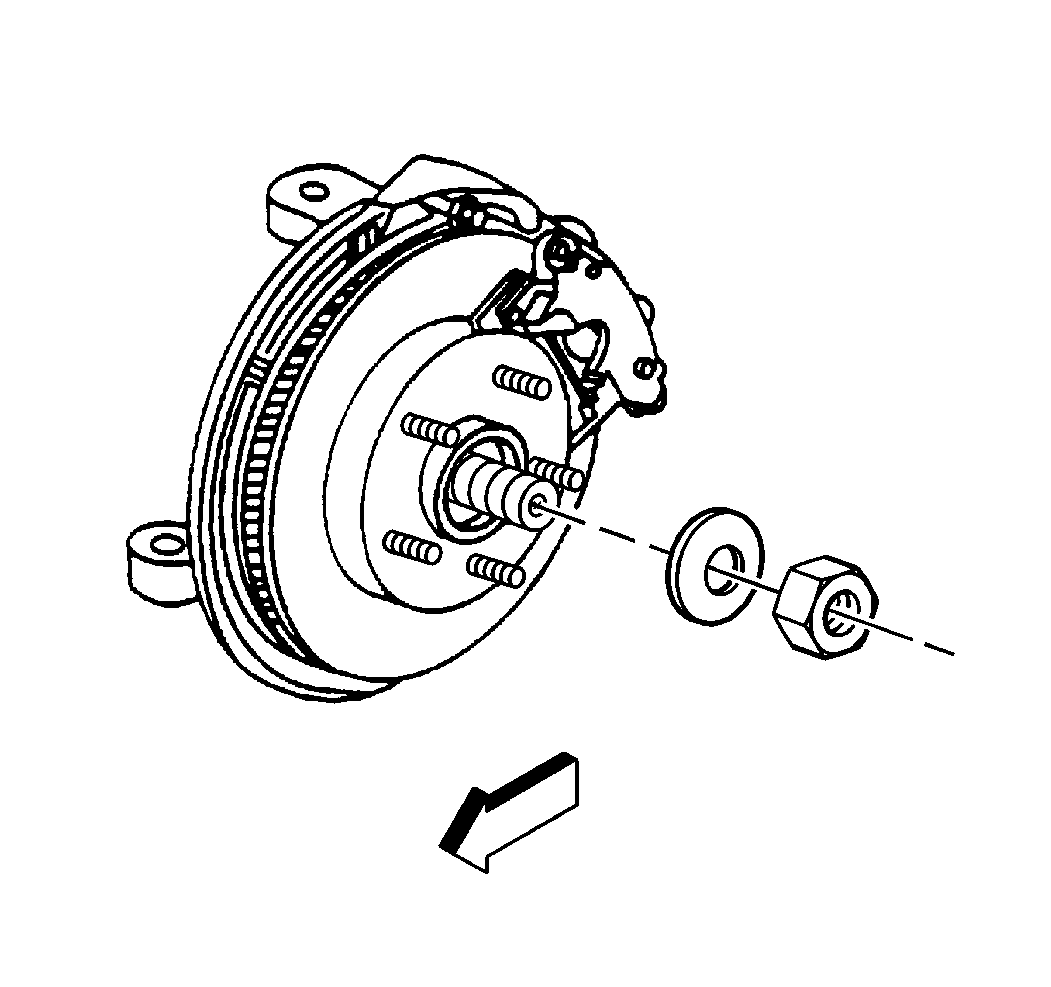
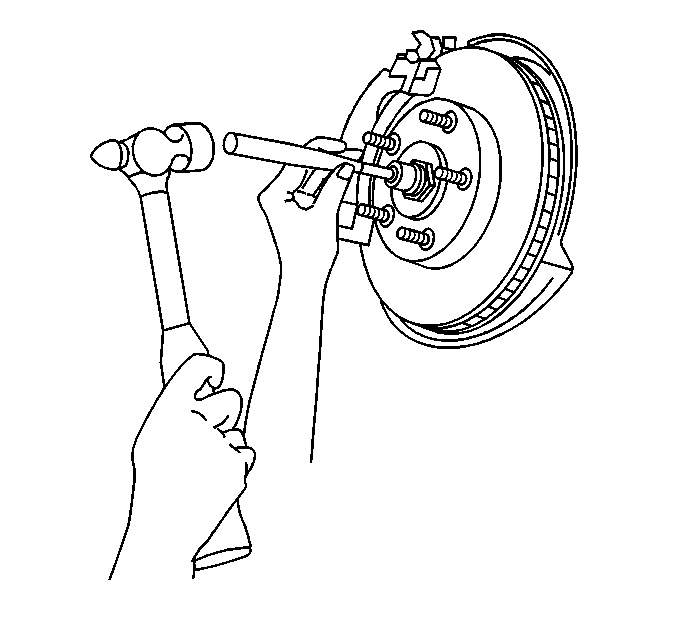
| 5.1. | Place a brass drift against the outer end of the wheel drive shaft in order to protect the wheel driveshaft threads. |
| 5.2. | Sharply strike the brass drift with a hammer. Do not attempt to remove the wheel drive shaft from the hub and bearing at this time. |
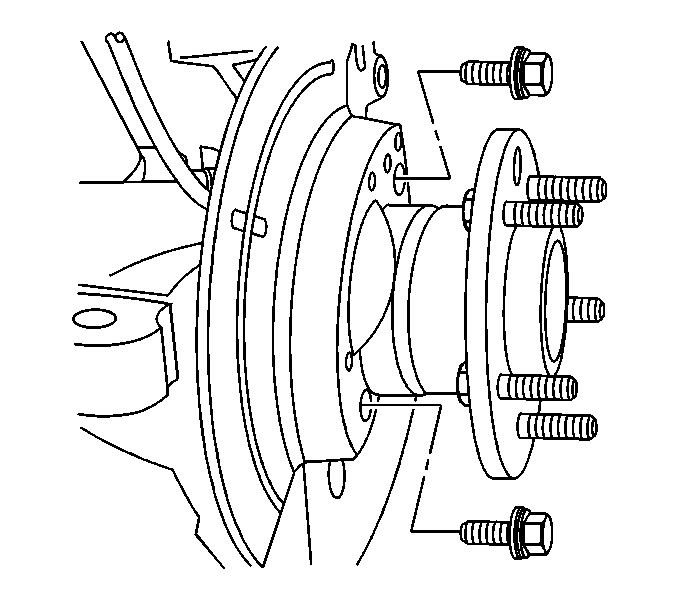
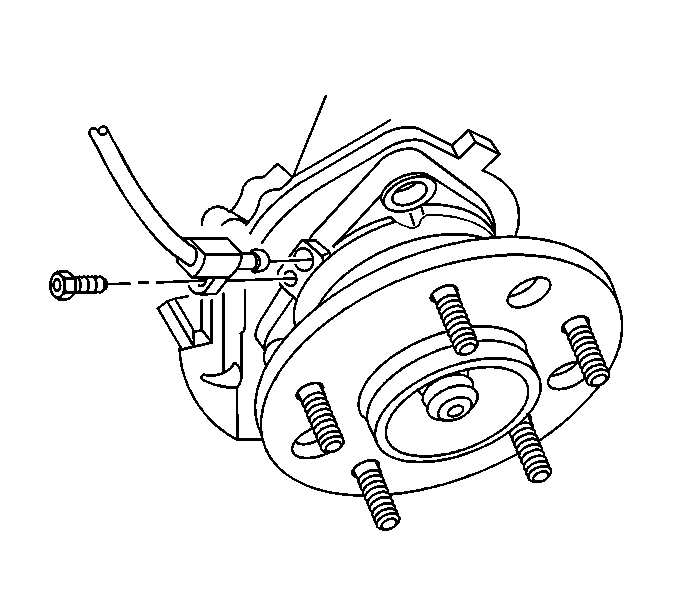
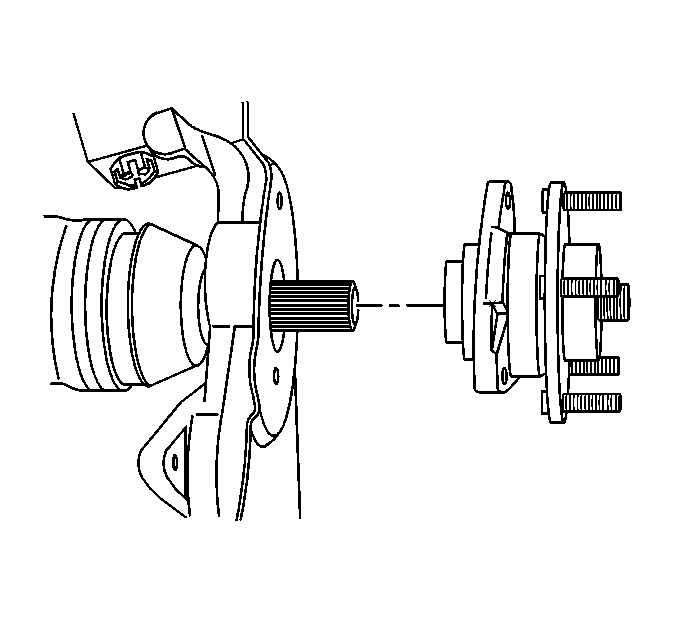
Installation Procedure
- Install the wheel hub and bearing.
- Install the wheel speed sensor to the wheel hub and bearing.
- Install the wheel speed sensor mounting bolt to the wheel hub and bearing.
- Install the splash shield.
- Install the wheel hub and bearing mounting bolts.
- Install the wheel drive shaft washer and the nut.
- Install the brake rotor. Refer to Brake Rotor Replacement in Disc Brakes.
- Install the tire and wheel. Refer to Tire and Wheel Removal and Installation in Tires and Wheels.
- Lower the vehicle.



Notice: Use the correct fastener in the correct location. Replacement fasteners must be the correct part number for that application. Fasteners requiring replacement or fasteners requiring the use of thread locking compound or sealant are identified in the service procedure. Do not use paints, lubricants, or corrosion inhibitors on fasteners or fastener joint surfaces unless specified. These coatings affect fastener torque and joint clamping force and may damage the fastener. Use the correct tightening sequence and specifications when installing fasteners in order to avoid damage to parts and systems.
Tighten
Tighten the wheel hub and bearing mounting bolts to 90 N·m
(66 lb ft).

Tighten
Tighten the wheel drive shaft nut to 200 N·m (147 lb ft).
Front Wheel Hub, Bearing, and Seal Replacement RWD
Tools Required
J 29117-A Wheel Bearing Cup Remover
Removal Procedure
- Raise the vehicle. Refer to Lifting and Jacking the Vehicle in General Information.
- Remove the tire and wheel. Refer to Tire and Wheel Removal and Installation in Tires and Wheels.
- Remove the brake caliper. Refer to Brake Caliper Replacement in Disc Brakes.
- Remove the dust cap from the wheel hub.
- Remove the cotter pin, the wheel hub nut, the washer, and the outer wheel bearing.
- Remove the wheel hub and bearing from the steering knuckle.
- Remove the inner wheel bearing seal.
- Remove the inner wheel bearing from the wheel hub.
- Remove the inner and the outer bearing races using the J 29117-A .
- Clean any grease from the wheel hub, the spindle, and the wheel bearings using clean solvent and a small brush with no loose bristles.
- Inspect the rotor. Refer to Brake Rotor Surface and Wear Inspection in Disc Brakes.
- Check the wheel bearings and the races for damage or wear. Refer to Wheel Bearings Diagnosis in Suspension General Diagnosis.

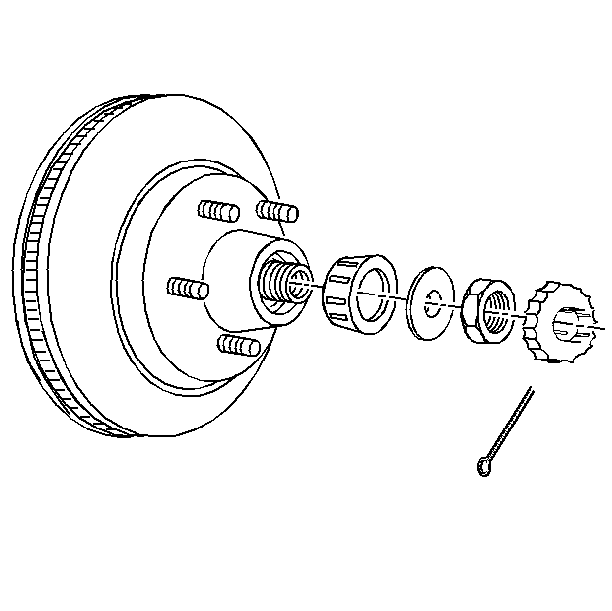
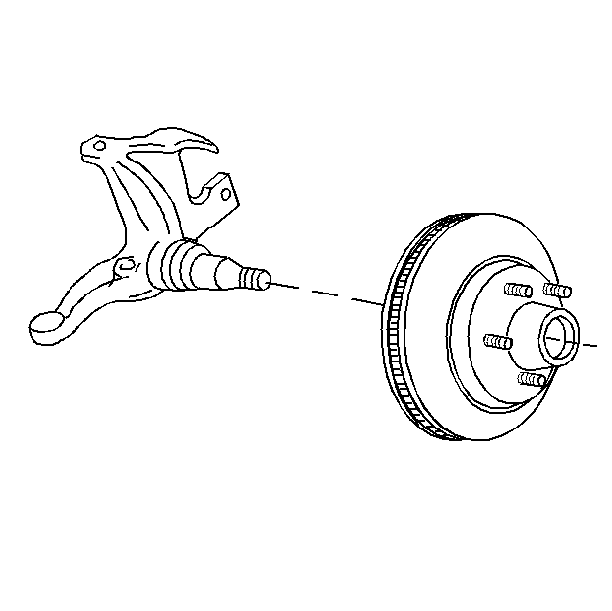
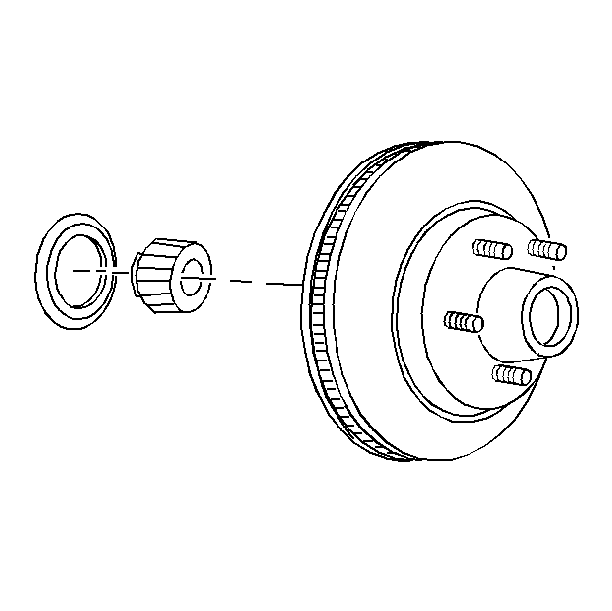
Pry out the seal and discard.
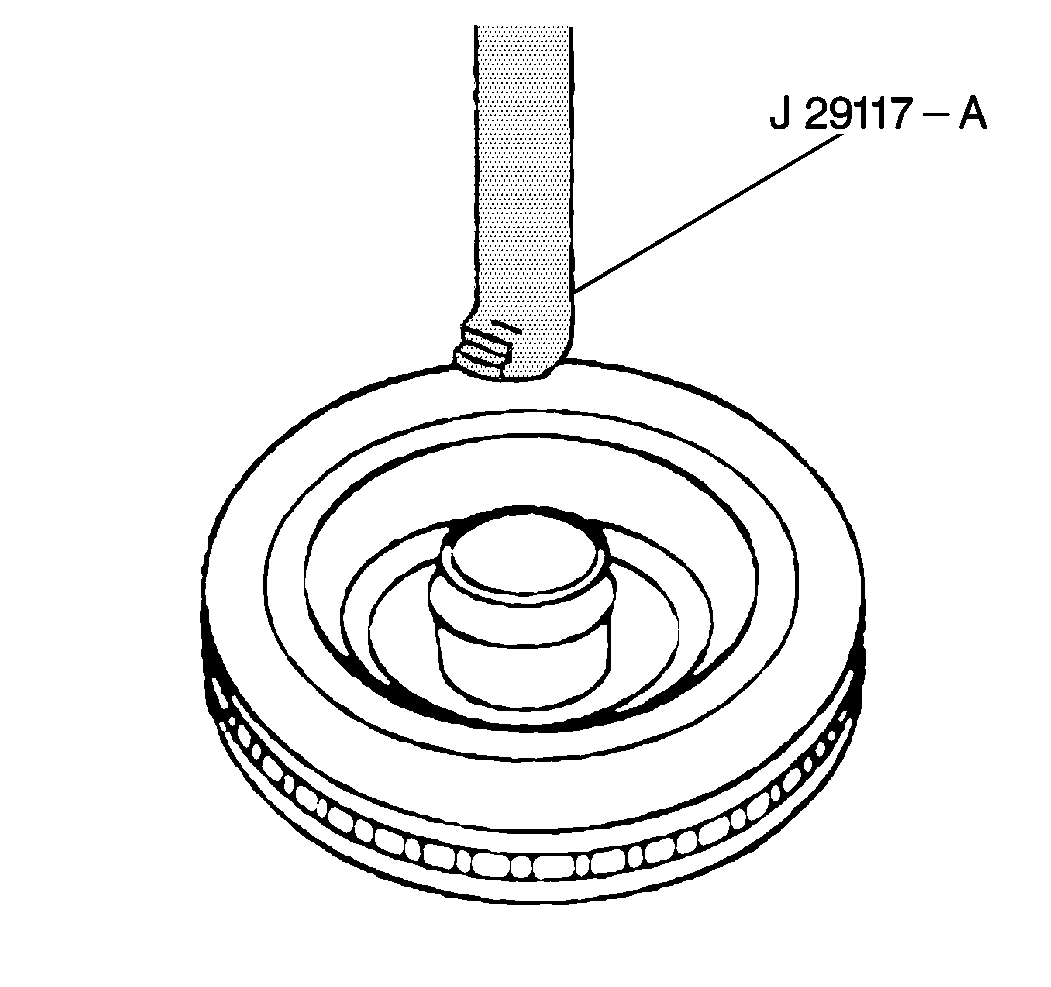
Notice: Do not spin the wheel bearings with compressed air to dry them-the wheel bearings may be damaged.
Installation Procedure
- Using a brass drift, install the bearing races into the wheel hub.
- Apply a thin film of grease to the spindle at the outer and the inner wheel bearing seat, the shoulder, and the seal seat.
- Apply a small quantity of grease inboard of each wheel bearing cup inside the wheel hub.
- Fill the wheel bearing, cone and roller assemblies, full of grease.
- Install the inner wheel bearing to the wheel hub. Apply an additional quantity of grease outboard of this wheel bearing.
- Install a new inner wheel bearing seal.
- Install the wheel hub. Do not damage the spindle threads.
- Install the outer wheel bearing. Press on the spindle until the wheel bearing fully seats against the wheel hub outer bearing.
- Install the wheel hub washer and the nut.
- Apply an additional quantity of grease outboard of the wheel bearing.
- Adjust the wheel bearings. Refer to Wheel Bearing Adjustment .
- Install the cotter pin.
- Install the cap on the wheel hub.
- Install the brake caliper. Refer to Brake Caliper Replacement in Disc Brakes.
- Install the tire and wheel. Refer to Tire and Wheel Removal and Installation in Tires and Wheels.
- Lower the vehicle.
Important:
• Use an approved high-temperature front wheel bearing grease. Refer
to
Fluid and Lubricant Recommendations
in Maintenance and Lubrication. • Do not mix the greases. Mixing may change the properties of each
grease used, resulting in poor performance.
Notice: Failure to completely pack the wheel bearing (cones, rollers, and cage) with grease will result in premature wheel bearing damage and/or wear.
| • | Use a cone-type grease packer that forces grease into the bearing. |
| • | If a cone-type grease packer is not available, pack the wheel bearings by hand. |
| • | If the wheel bearings are packed by hand, work the grease into the bearings between the rollers, the cones, and the cage. |
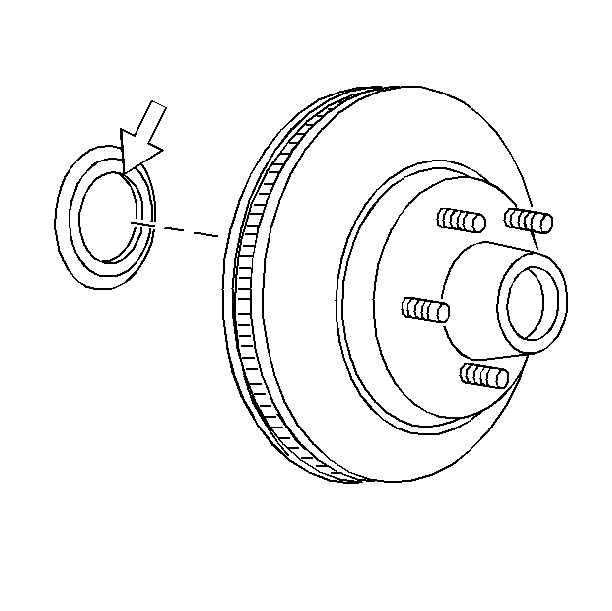
| 6.1. | Use a flat-surfaced tool in order to install the inner wheel bearing seal so that the seal is flush with the wheel hub flange. |
| 6.2. | Lubricate the inner wheel bearing seal lip with a thin layer of grease. |


Notice: Use the correct fastener in the correct location. Replacement fasteners must be the correct part number for that application. Fasteners requiring replacement or fasteners requiring the use of thread locking compound or sealant are identified in the service procedure. Do not use paints, lubricants, or corrosion inhibitors on fasteners or fastener joint surfaces unless specified. These coatings affect fastener torque and joint clamping force and may damage the fastener. Use the correct tightening sequence and specifications when installing fasteners in order to avoid damage to parts and systems.
Tighten
Tighten the wheel hub nut to 16 N·m (12 lb ft),
while turning the wheel assembly forward.

